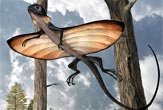
Get the world’s most fascinating discoveries delivered straight to your inbox.
You are now subscribed
Your newsletter sign-up was successful
Want to add more newsletters?
Join the club
Get full access to premium articles, exclusive features and a growing list of member rewards.
An ancient arboreal lizard coasted through the air using a wing-like membrane stretched across elongated ribs, a new fossil reveals.
Dubbed Xianglong zhaoi, the gliding lizard [image] lived during the Early Cretaceous period, about 150 million years ago. The specimen, detailed in the March 19 issue of the journal for the Proceedings of the National Academy of Sciences, is about 6 inches long, and its immature features suggest it died at a young age.
The fossil [image], described by Xing Xu of Shenyang Normal University in China and his colleagues, was discovered in the Liaoning Province in northeastern China, a site that has yielded a treasure trove of feathered dinosaurs and early bird remains in recent years.
Xianglong’s gliding membrane, called a “patagium,” is stretched across eight elongated dorsal ribs. Fully expanded, the layer of stretchy skin would have spanned about 4.5 inches across.
Xianglong had curved claws that would have enabled it to dwell in treetops, from whose high perch it could launch into the air. Once airborne, the little lizard could probably glide farther than modern flying lizards, perhaps as far as half a football field at a time, Xu said.
The lizard’s “wings” share several similarities with the wings of modern fast-flying birds, suggesting it might have been more nimble in the air than other gliding lizards (though not as agile as say a hawk).
Most gliding animals, such as “flying” frogs and squirrels, use a membrane spread between their toes or between their body and legs to stay airborne. A gliding membrane spread between elongated ribs is only known to occur in an ancient lizard-like animal that lived during the Late Triassic era and certain living dragon lizards in Southeast Asia.
Get the world’s most fascinating discoveries delivered straight to your inbox.
“It is really amazing to see evolution making nearly identical structures in animals of different origins spanning such a long history,” Xu told LiveScience.
- Ancient Flying Reptiles Discovered
- First Delta-Wing Fighter Was a Reptile
- Mammals Might Have Soared Before Birds
- Avian Ancestors: Dinosaurs That Learned to Fly
 Live Science Plus
Live Science Plus










